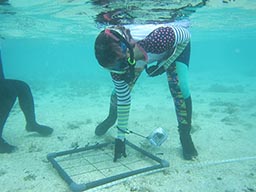- ABOUT US
- PROGRAM AREAS
- CONSERVATION APPROACH
- EDUCATION
- MULTIMEDIA
- The Nature Conservancy is recommended for $600,000 to continue the Reef Resilience Network with a focus on improving coral reef management effectiveness (national; 4 years);
- One national project will fund continued activities of the Reef Resilience Network, a long-term partnership led by The Nature Conservancy, to develop free online coral conservation management and restoration training and tools. One regional project will focus on providing disaster and disturbance response coordination within the Pacific Islands region.
- The University of Florida is recommended for $300,000 to prepare the Pacific region for disturbance response (regional; 4 years);
- The Nature Conservancy is recommended for $250,000 in funding to develop stewardship partnerships and assist in the creation of coral reef action plans for Guam, Commonwealth of the Northern Mariana Islands, the Republic of Palau, the Federated States of Micronesia, and the Republic of the Marshall Islands (local; 2 years); and
- Sail for Reefs, Inc. is recommended for $100,000 in funding to develop stewardship partnerships and assist in the creation of coral reef action plans for Puerto Rico and the U.S. Virgin Islands (local; 2 years).
- Local Coral Community Group Support: This priority directly supports the development of local interested stakeholder groups to create coral reef stewardship partnerships and coral reef action plans.
- National Coral Conservation Support: This priority supports regional or national organizations to increase coral conservation and resilience knowledge and build capacity across multiple States.
NOAA announces funding for local and national coral reef conservation capacity building support grants
Takeaway: NOAA is announcing up to $1.25 million in funding for coral reef conservation under the Ruth D. Gates Grant Program, covering four new projects that address local and national capacity building gaps across domestic coral reef jurisdictions and the Freely Associated States. Recipients will provide approximately $1.25 million in additional, non-federal support to these projects.

Building technical capacity at national and regional scales is critical for the success of coral reef conservation. This is the first time NOAA CRCP has funded Ruth D. Gates National and Local Capacity Building Support awards. However, similar awards have been issued previously as ‘Domestic Capacity-Building’ awards. The following applications are recommended for funding:
Two locally-focused projects are recommended for funding and include the development of stewardship partnerships and coral reef action plans in Puerto Rico and the U.S. Virgin Islands and development of stewardship partnerships and coral reef action plans for Guam, the Commonwealth of the Northern Mariana Islands, the Republic of Palau, the Federated States of Micronesia, and the Republic of the Marshall Islands.
The NOAA Ruth D. Gates National and Local Capacity Building Support opportunity was initiated under the NOAA Coral Reef Conservation Program. It aims to support the conservation and restoration of coral reef ecosystems by strengthening local nongovernmental organizations' and/or other interested stakeholder groups' ability to participate in future coral reef stewardship partnerships. In 2024, there were two funding priorities:


Dr. Ruth Gates was the Director of the Hawaiʻi Institute of Marine Biology and the first woman to be President of the International Society for Reef Studies. She was a renowned marine biologist who made it her life's work to save the world's fragile coral reefs from the effects of warming water temperatures. She was known for her innovative science and her firm belief that coral reefs could be saved. In 2018, at the age of 56, she passed away five months after she was diagnosed with cancer. She was a partner and collaborator with NOAA on coral conservation.
About Us

The NOAA Coral Reef Conservation Program was established in 2000 by the Coral Reef Conservation Act. Headquartered in Silver Spring, Maryland, the program is part of NOAA's Office for Coastal Management.

The Coral Reef Information System (CoRIS) is the program's information portal that provides access to NOAA coral reef data and products.
Work With US
U.S. Coral Reef Task Force
Funding Opportunities
Employment
Fellowship Program
Contracting Assistance
Graphic Identifier
Featured Stories Archive

Access the archive of featured stories here...
Feedback
Thank you for visiting NOAA’s Coral Reef Conservation Program online. Please take our website satisfaction survey. We welcome your ideas, comments, and feedback. Questions? Email coralreef@noaa.gov.
Stay Connected
Contact Us
NOAA’s Coral Reef Conservation Program
SSMC4, 10th Floor
1305 East West Highway
Silver Spring, MD 20910
coralreef@noaa.gov
